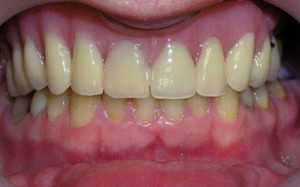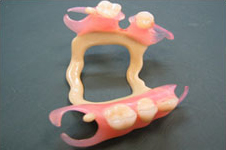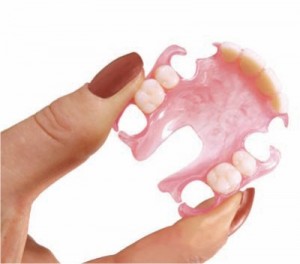Disadvantages of Nylon Dentures

Modern removable dentures are designed to help a person who has lost his teeth due to various reasons, restore their function.
One of the types of removable prosthetics is the installation of a nylon denture.
Currently, nylon designs have become a good alternative to acrylic and clasp dentures.
They make nylon structures from nylon, which has some features:
- It has high strength and resistance to high loads.
- In addition, nylon prostheses are hypoallergenic and, therefore, they can be used by people suffering from an allergic reaction to metal and acrylic.
- Nylon does not stain with food coloring and does not change color over time.
- With proper care of the structure, the material retains its original appearance and does not require polishing.
- The prosthesis is fixed to the abutment teeth with the help of clasps made of nylon and having the color of the gums or teeth, and therefore, they are completely invisible to others.
When apply
Nylon structures are used in the following cases:

- If the patient has an allergic reaction to metal or acrylic plastic.
- For restoration from one to 4-5 teeth.
- If you need to make a temporary prosthesis.
- With heart disease and diabetes.
- If the patient’s profession is associated with increased injuries.
- With the wrong bite.
- For dental prosthetics for children.
In addition, you should take into account the fact that the installation of nylon prostheses has some contraindications:
- Excessive tooth mobility.
- Periodontal disease and periodontitis are a contraindication to the use of nylon construction.
- Insufficient height of the crown of the supporting teeth.
- Severe gum atrophy.
- Excessive compliance of the mucous membrane of the gums.
Advantages
Compared to other removable dentures, a nylon prosthesis has the following advantages:

- Due to its flexibility and high strength, the construction easily takes the required shape and retains it for a long time.
- Excellent fixation of the structure in the mouth.
- High biocompatibility of the material with tissues of the oral cavity.
- The absence of metal parts makes the design invisible when talking and smiling.
- The prosthesis is easy to care for.
disadvantages
Disadvantages of Nylon Dentures boil down to the following:
- Caring for the prosthesis involves the use of expensive tools. To care for the product, it is unacceptable to use ordinary paste and a toothbrush, since the prosthesis can be easily scratched, which will lead to stains.Moreover, the design is not polishable, and the scratched part will serve for the accumulation of microorganisms and the formation of deposits.
- The presence of discomfort and pain when using a prosthesis associated with trauma to the oral mucosa.
- The nylon prosthesis has an elastic frame, which causes a high difference in the load on the teeth during chewing. And this can accelerate the atrophy of bone tissue under construction and, as a result, the prosthesis sags.
- During operation, bone tissue is destroyed at the attachment point of the supporting teeth. Nylon clasps are not able to withstand increased load during chewing, which contributes to trauma to the edge of the gums and leads to destruction of the bone.
- They have a fairly short service life, which is associated with a decrease in bone tissue and further subsidence of the structure. Bone tissue decreases by 1 mm per year when using the nylon construction. It is recommended that after sinking the product 2-3 mm to replace it.
- The need for constant correction of the prosthesis. If the prosthesis is used to restore one or two teeth, then correction is not required as often as for long-length artificial teeth.
- The high cost of the product and the need for frequent replacement of the design. The price of a nylon prosthesis is 4-5 times higher than the cost of an acrylic product.
Consequences of use
The main disadvantages of nylon prostheses are gum injury and atrophic processes of bone tissue.
Long-term use of nylon products can lead to such consequences.
The most common types of injuries:
- Injury to the marginal gingiva is associated with an improper load distribution during chewing. All the load is transferred to the gingival mucosa, which leads to the destruction of the gingival margin around the tooth and causes an inflammatory process.
- Periodontal inflammation as a result of trauma to the gums with clasps.
- Atrophy of bone tissue under the dental structure occurs as a result of the influence of chewing pressure on the mucous membrane, which is located under the prosthesis. As a result of the loss of bone tissue, the product sags. With a pronounced subsidence of the clammer prosthesis, they will begin to cut into the mucous membrane surrounding the abutment tooth and cause the destruction of the marginal periodontium of a healthy tooth.